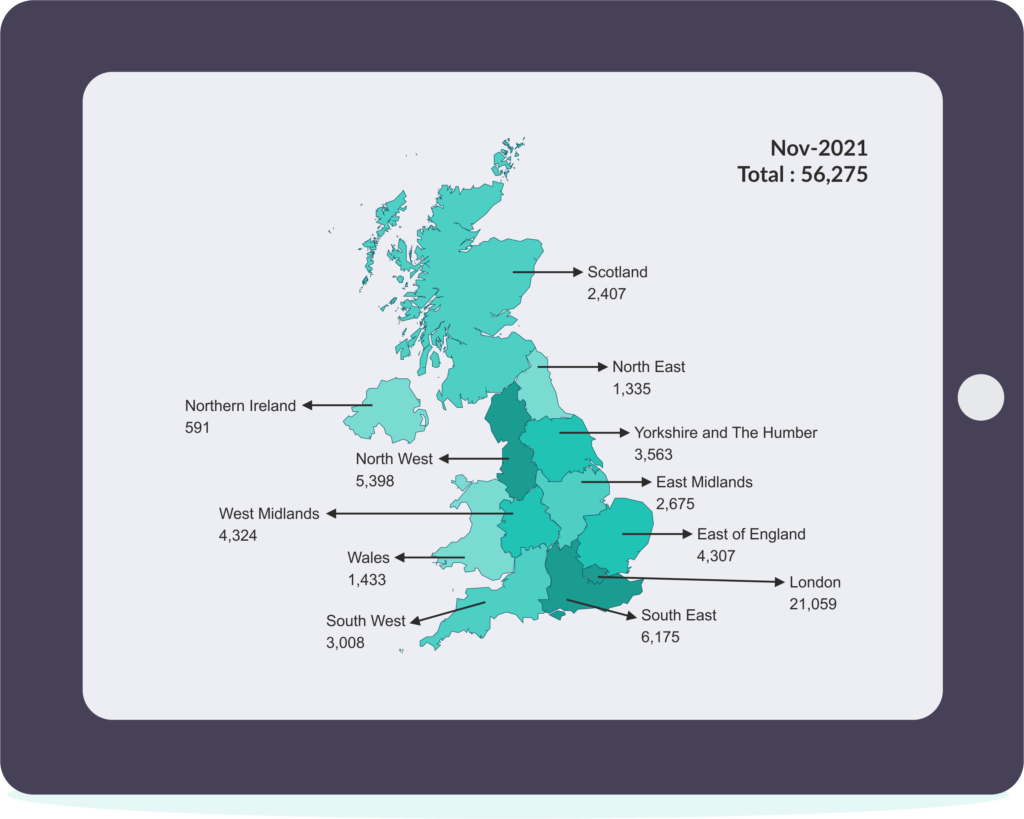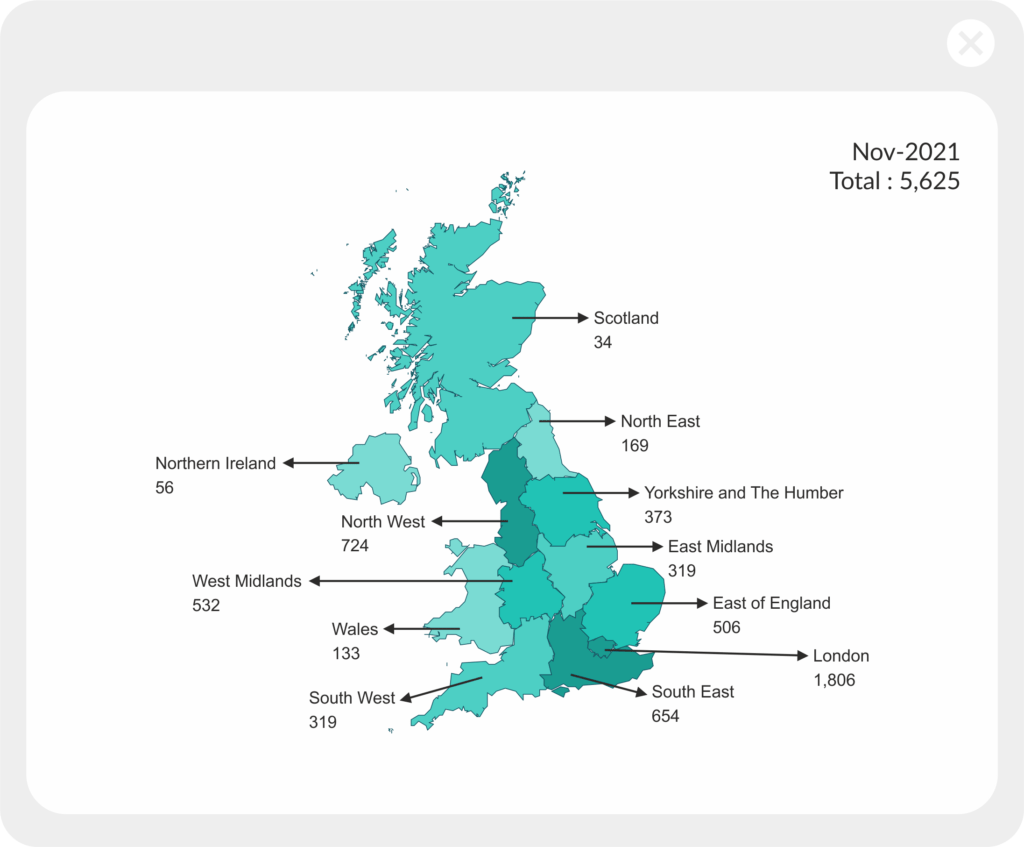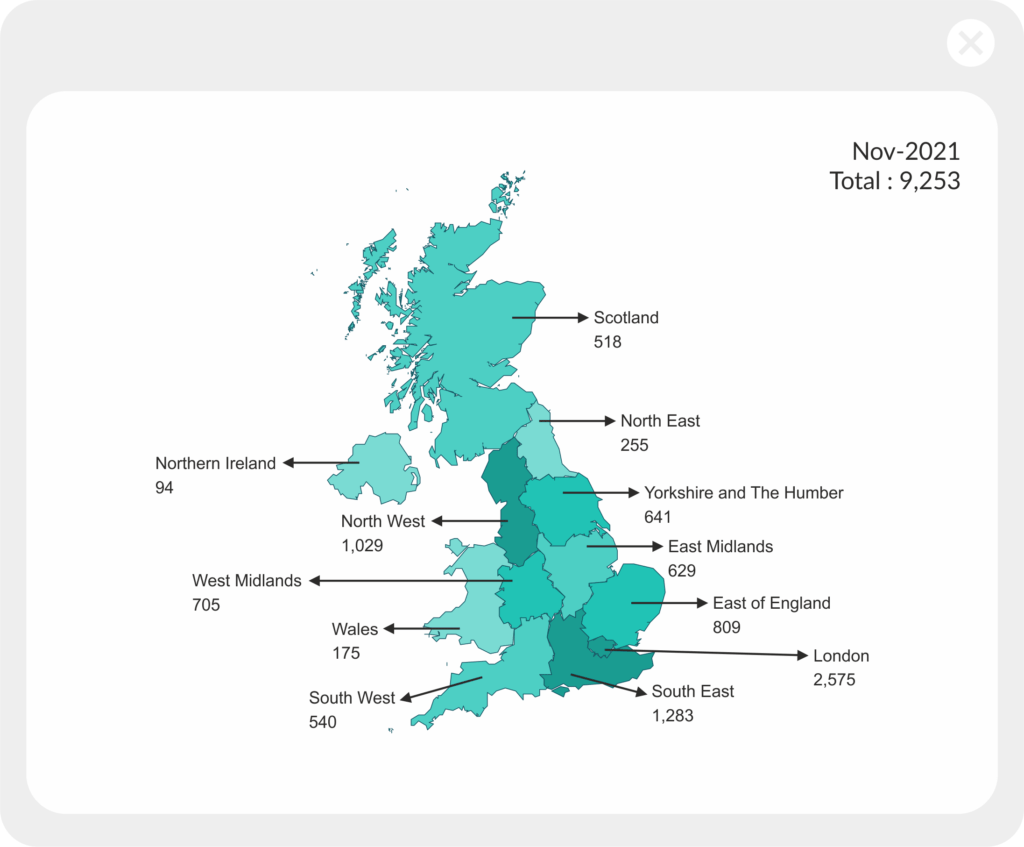Key Events of the Month
What’s happening in the UK – With the year winding down to a close, it’s always helpful to reflect on what the past 12 months have brought us. November, in particular, continues the recent trend of normal growth, though yet another COVID variant may throw a spanner in the works in the near future. A slightly smaller 56,275 companies were formed this month compared to the beginning of the year, but this certainly doesn’t indicate a reduction in economic growth in itself.
Companies Incorporated November 2021

In addition to this, 5,625 CCJs were filed this month, with another 9,253 charges registered. This is slightly up from the previous month’s 4,126 CCJs, perhaps signaling some future holiday troubles.
New CCJs Filed November 2021

New Charges Filed November 2021

2021 – An Eventful Year
Whilst the year draws down, figures for the January – December period may seem to look a little optimistic. In total, around 663,338 new companies were formed during this time, with an additional total of 41,377 CCJs filed and 89,245 charges registered. However, this isn’t the full story. During this time, a massive 877,895 companies were dissolved over the past year.
This totals at a net loss of around 214,557 companies. Although this figure is worrying, it’s hardly surprising. COVID-19 decimated the UK economy towards the beginning of the year, and although there were good signs of recovery, the damage had already been done. Looking on the bright side, these failed companies may be leaving a market share behind for other newer and better companies to pick up in the future.
We can’t begin a recap of 2021 without talking about the elephant in the room: the COVID crisis. Although over-use of the word ‘unprecedented’ was already poked fun at in a recent episode of University Challenge, we’d be hard-pressed to find a word more fitting. Expecting businesses to continue to fully function in an environment made uncertain by not only the disease itself but by the governmental regulations surrounding them was always a recipe for disaster. Footfall was harshly reduced in city-centres around the world, but especially in major UK cities such as London, Birmingham and Manchester. This reduction in footfall hit hard. London alone lost around 273,782 companies throughout the course of the pandemic, with other cities experiencing proportional losses. Without any people travelling through city centres for work or leisure, cafes, restaurants and high-street shops were hit hardest, especially the ones closer towards the centre. A pandemic certainly didn’t mean that rent for these high-demand areas would be cut, though the furlough scheme did prove to be the saviour for some.
The widely popular furlough scheme saved an estimated 1.14 million UK jobs, with 21% of companies having at least one furloughed member. However, this came at a huge cost to the government, especially seeing as many saw this as an opportunity to cash in on the scheme and cash out their failing businesses. The end of June saw a massive number of companies struck off from Companies House, raising alarm bells at widespread furlough fraud. Because these companies were struck off, their obligation to pay back any loans from big banks or small lenders disappeared with them. This included loans given out from the Coronavirus Business Interruption Loan Scheme (CBILS) and the Bounce Back loan scheme. Although there has yet to be any action regarding this yet on the part of the government, it seems that investigation of all these companies may prove difficult considering the widespread nature of the fraud.
Despite these negative figures, economic growth for the UK seems to be back on track. Recent statistics done by Statista have found that although growth shrank by a massive 9.85% in 2020, the UK economy has so far been able to bounce back a projected rise of 6.76% by the end of the year. Although this still leaves us with an overall contraction of 3.09% across the two years, the recent rise, even in light of Brexit and international political upheaval, seems to be quite hopeful for UK businesses.
The overall economic growth may seem good for business owners everywhere, but it hasn’t come without consequences. One of the hardest pills to swallow for many has been the massive increase in wealth for the top 1%, especially current billionaires. Recent figures from Forbes estimate that around 650 of the top wealthiest billionaires in the USA increased their net worth by $1 trillion, whilst many earning a fraction of this were left at the highest risk throughout the pandemic. Alongside this, the pandora papers scandal also shook the globe, with famous figures being implicated in massive fraud and tax evasion left, right and centre. This even includes former Prime minister Tony Blair, who avoided paying hundreds of thousands in stamp duty by agreeing to buy a London property alongside a business rather than just the property itself.
It’s events like these alongside the constant threat of the pandemic that cause huge cases of demoralisation within the UK workforce. Recently, this demoralisation has shown itself in the significant number of vacant staff spaces in thousands of UK companies. A study found that more than 25% of UK businesses are putting their existing employees under pressure due to an overall lack of staff. It’s not yet quite clear where the people who used to staff these roles have gone. Still, it would be a reasonable hypothesis to assume that it’s a combination of overseas workers returning to their home countries amidst COVID and the overall demoralisation of the workforce.
Should we expect volatility to rule again in 2022?
Although 2021 has been a rough year for many, with business closures far outweighing new businesses registered, there may be light on the horizon. The UK economy is already looking up, and by mid-2022 should be back to previous pandemic levels, assuming no new lockdowns due to different COVID variants. Perhaps these recent events may warrant some cautious optimism as we head out of 2021 and into 2022.
Related Articles:
